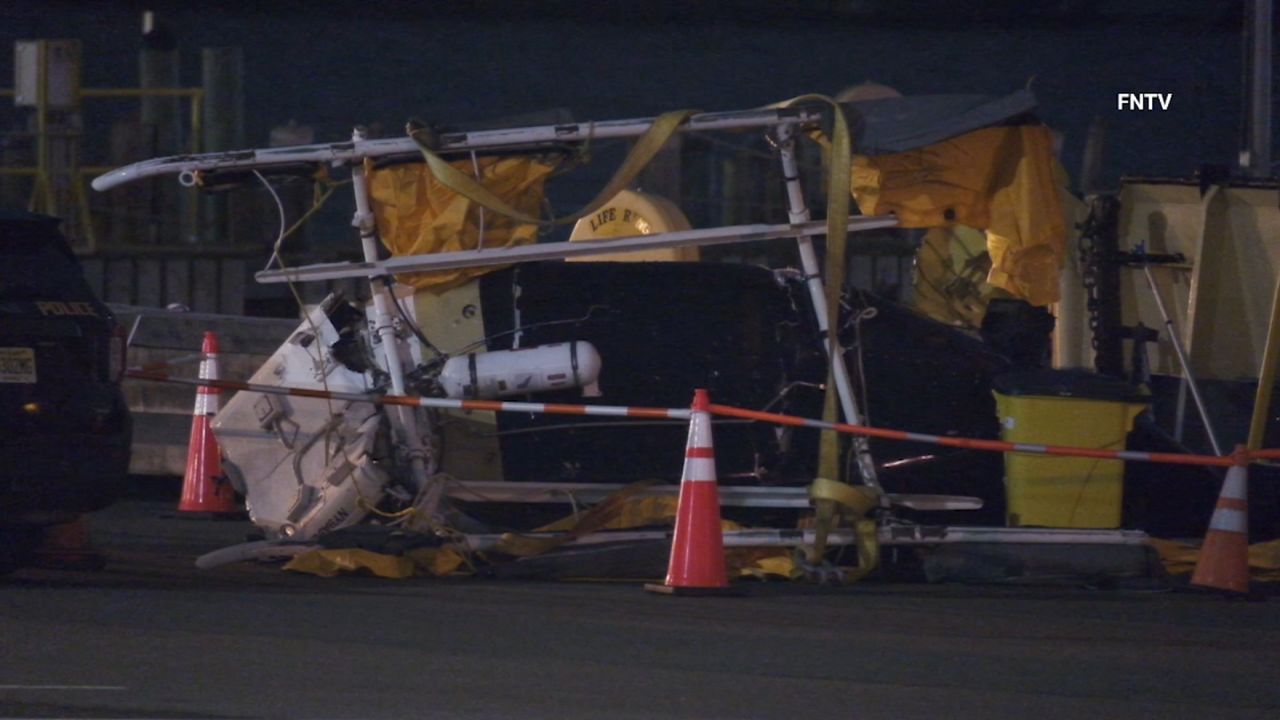A day after a helicopter crash in the Hudson River claimed six lives, Mayor Eric Adams and other city officials addressed the tragedy, while weighing in on a potential ban on nonessential flights over New York City.
In separate interviews with “Mornings On 1” Friday, Adams — joined by FDNY Commissioner Robert Tucker — and Manhattan Councilman Erik Bottcher praised the work of first responders but offered different takes on helicopters in the city.
Adams reflects on tragedy, urges helicopter safety — not a ban
Speaking with NY1’s Pat Kiernan, the mayor said the city is cooperating with the National Transportation Safety Board, which is leading the investigation into the crash.
“The NTSB is conducting a thorough investigation, and we're going to be there to collaborate with whatever information is needed from the FDNY, NYPD,” he said. “Our role right now is a supportive role, and we're going to give any observation, any video footage or whatever information we can help to find out exactly what happened in this very tragic incident.”
Adams stopped short of calling for a ban on nonessential helicopter flights, instead highlighting how the industry contributes to the city’s economy.
“As you indicated, and I remember in 1977, when the helicopter crashed into the Pan Am Building, we made adjustments and modifications,” he said. “We don't ban vehicles on our roads. The number of people that die from vehicle crashes is just astonishing. Air traffic is a safe way of traveling. It is part of our economic ecosystem.”
He stressed that 65 million tourists visited New York City in 2024, adding that many visitors want to be able to have access to helicopter tours.
“People want to see our city from the sky. We need to focus on safety, and if this pilot or if the machinery was not properly maintained or [didn’t have] the proper records, that is what our focus is,” he added.
FDNY chief touts training, sidesteps helicopter debate
Tucker, who joined Adams, said that his role is to ensure a quick response when tragedy occurs, not weigh in on a potential tourist helicopter ban.
“We are trained for what happened yesterday,” he said. “We train as a scuba team. We train as rescue swimmers. We train with our partners at the NYPD and, frankly, we train with our partners on the other side of the river in New Jersey.”
Asked if the helicopter crash should prompt new regulations, in the same way frequent e-bike fires did, Tucker said he planned to “focus on making sure that we're here for the eight and a half million people of New York City in our capacity as a fire department, and leave all that other stuff to smarter people than me.”
“Air travel in New York is a part of the ecosystem of our tourism and our business community, and frankly, it’s my job to make sure that the members of the FDNY are the most highly trained, ready-to-act fire and rescue service in the world,” he added.
Councilman pushes to get nonessential flights ‘out of the air’
Bottcher, who represents the City Council district on Manhattan’s West Side closest to where the crash took place, took a sharper stance.
“I want to get nonessential helicopter flights out of the air over New York City,” he said Friday morning. “This is just one of the latest of many tragedies.”
He also noted “the disruption that they cause New Yorkers.”
“We get a ton of calls and emails every year from New Yorkers about the noise that helicopters cause over our neighborhoods, right on the West Side in the Hudson River Park. The West Side heliport causes a huge amount of disruption for people in the park,” Bottcher said. “So we need to do something about it and get these out of the skies.”
City Councilmember Christopher Marte, meanwhile, also called for a ban on nonessential helicopter flights after Thursday’s fatal crash.
In a statement, Marte — whose district includes SoHo and the Lower East Side — maintained the crash was “wholly preventable.”
“Helicopters should be reserved for emergency response, essential news coverage and public safety operations — not sightseeing or luxury travel,” he said, in part. “While now is a moment for grief, it is also a moment for serious reflection and urgent policy change.”







